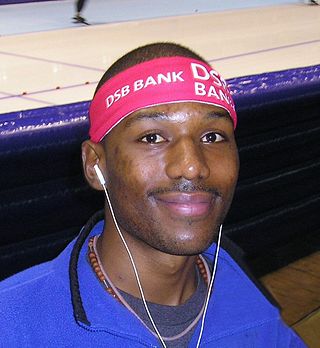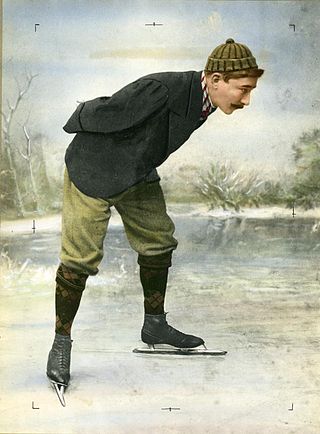
The International Skating Union organises the following World Championships in the sport of speed skating:
The World Allround Speed Skating Championships are a series of speed skating events held annually to determine the best allround speed skater of the world. The event is held over two days, with all skaters entering the first three distances and the best eight skaters over these distances getting to ride the last event. The results of the races are converted to points, and the skater with lowest total score wins the championship.

Adrianus "Ard" Schenk is a former speed skater from the Netherlands, who is considered to be one of the best in history. His first Olympic success came in 1968, when he won a silver medal at the 1968 Winter Olympics. Between 1970 and 1972 Winter Olympics, Schenk won three consecutive World Allround Speed Skating Championships. He won three gold medals at the 1972 Winter Olympics, becoming, along with Galina Kulakova of Soviet Union, the most successful athlete there.

Shani Earl Davis is an American former speed skater.

Sven Kramer is a retired Dutch long track speed skater who has won an all time record nine World Allround Championships as well as a record ten European Allround Championships. He is the Olympic champion of the 5000 meters at the Vancouver 2010, Sochi 2014 and Pyeongchang 2018 Olympics, and won a record 21 gold medals at the World Single Distance Championships; eight in the 5000 meters, five in the 10,000 meters, and eight in the team pursuit. Kramer used to be the world record holder in the team pursuit and broke the world records in the 5000 meter and 10,000 meter events three times. By winning the 2010 World Allround Championship, Kramer became the first speed skater in history to win four consecutive world allround championships and eight consecutive international all round championships. He was undefeated in the 18 international allround championships he participated in from the 2006/2007 season until the 2016/2017 season. From November 2007 to March 2009, he was ranked first in the Adelskalender, but despite his dominance as an all-round skater he has since been overtaken on that list by Shani Davis and, more recently, by his teammate Patrick Roest.
The International Skating Union has organised the World Allround Speed Skating Championships for Men since 1893. Unofficial Championships were held in the years 1889–1892.

Charles Mathiesen was a speed skater who was active from 1930 to 1948.

Erling Martin Jonny Nilsson was a Swedish competitive speed skater. He was the men's Olympic champion in the 10 000 m skating in 1964.

Nikolay Vasilyevich Strunnikov was a Russian World Champion in speed skating. In addition, he was also successful as a cyclist. Nikolay Strunnikov was born in Sknyatino and quickly became a very enthusiastic and highly disciplined athlete, training daily. During the summer, he trained on bicycle and during the winter, he trained in speed skating and played bandy. After returning from work, he would always be on the ice at the same time every day to skate his rounds, regardless of weather conditions. Even at times the temperature was −40 °C, he would still go through his entire training programme. His enthusiasm and dedication paid off and in 1906, he won silver at the Russian National Allround Championships.

The 1894 World Allround Speed Skating Championships took place at 10 and 11 February 1894 at the ice rink Saltsjöbanen in Stockholm, Sweden. 19 skaters from six countries participated. It is the first World Allround Speed Skating Championships skated outside off Amsterdam. The Dutch skater Jaap Eden was the defending champion. No new champion was declared because none of the skaters won three distances.

The 1895 World Allround Speed Skating Championships took place at 23 and 24 February 1895 at the ice rink Mjøsen in Hamar, Norway. There was no defending champion. In 1894 no champion was declared because none of the skaters won three distances. Jaap Eden became the first skater to win two world titles.

The 1897 World Allround Speed Skating Championships took place on 5, 6 and 9 February 1897 at the ice rink Crystal Stadium in Montréal, Canada. It was the first World championship outside of Europe. Canada had the honour of organizing this World championship because it was the first non-European member of the International Skating Union.

The 1898 World Allround Speed Skating Championships took place at 6 and 7 February 1898 at the ice rink Eisstadion in Davos, Switzerland.

The 1900 World Allround Speed Skating Championships took place at 24 and 25 February 1900 at the ice rinks Frognerkilen in Kristiania, Norway. The first day was skated at the ice rink Friedenauer Sportplatz. Due to the bad ice conditions the second day the distances were skated at the ice rink Westeisbahn.
The 1890 World Allround Speed Skating Championships took place at 3 and 4 January at the ice rink Museumplein in Amsterdam, Netherlands. It's an unofficial championship because the ISU was founded in 1892.

The 1891 World Allround Speed Skating Championships took place at 6 and 7 January at the ice rink Museumplein in Amsterdam, the Netherlands. It's an unofficial championship because there was no International Skating Union

The 1908 World Allround Speed Skating Championships took place at 8 and 9 February 1908 at the ice rink Eisstadion in Davos, Switzerland. THis year it was the first time also Silver and Bronze medals were awarded. Also a point system was introduced to make a ranking, but the rule that if one won three distances became automatic World champion was still valid.

The 1909 World Allround Speed Skating Championships took place at 27 and 28 February 1909 at the ice rink Gamle Frogner in Kristiania, Norway.

The 1912 World Allround Speed Skating Championships took place at 17 and 18 February 1912 at the ice rink Gamle Frogner in Kristiania, Norway.

The 1911 World Allround Speed Skating Championships took place at 5 and 5 March 1911 at the ice rink Øen Stadion in Trondheim, Norway.












